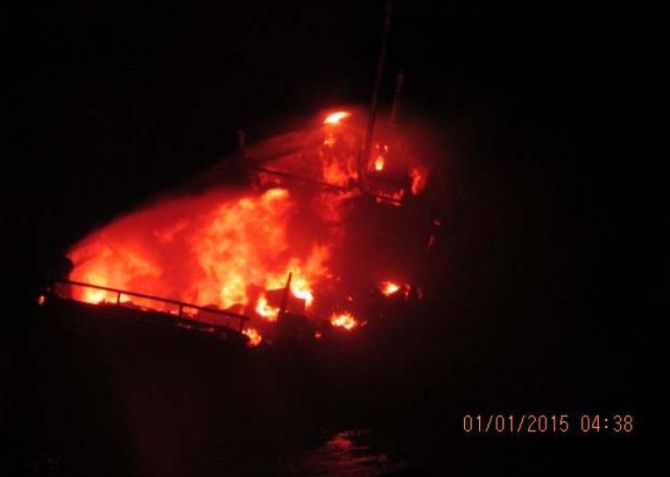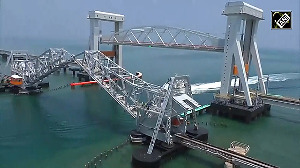 'Imagine for a moment that the Coast Guard was unable to stop the vessel and it reached Porbandar with its cargo/personnel and targeted the event at which the prime minister was present,' says Colonel Anil A Athale (retd).
'Imagine for a moment that the Coast Guard was unable to stop the vessel and it reached Porbandar with its cargo/personnel and targeted the event at which the prime minister was present,' says Colonel Anil A Athale (retd).
A few years ago, then United States secretary of state Hillary Clinton had described Pakistan as a global headache. Recent events show that from the headache it has began to resemble a cancer. But yet the world seems to have outsourced dealing with Pakistan to India, while countries like China and the US continue to support it with military and economic aid.
Why should a sub-continental issue be a global challenge?
First and foremost is the fact that it is now accepted by most experts that even a 'limited' nuclear war in the subcontinent can have disastrous effect on the global climate.
Preventing a nuclear exchange in the Indian sub-continent is in the interest of the world at large.
If nuclear weapons are used for the first time since August 1945, the long held taboo will end. The global nuclear anarchy that this will engender will be a threat to the very existence of life on earth.
It seems that the world's major powers seem content to leave it to India. This is unworkable as well as unfair. After all, the West is responsible in helping Pakistan get its hands on nuclear weapons.
In 1977 Leybold Heraeus of Hanan, Germany, sold Pakistan vacuum pumps and equipment to be used in uranium enrichment. The same year the United Kingdom sold Pakistan 30 high-frequency inverters for controlling centrifuge speeds.
Between 1977 and 1980, German businessman Albrecht Migule shipped an entire nuclear plant in 62 truck loads to Pakistan. He also provided on site support by German technicians to supervise construction of the plant at Dera Gazi Khan. Migule was found guilty and merely fined $10,000 and give a six-month suspended sentence!
In 1983, China transferred the entire design of nuclear weapons to Pakistan and also gave it uranium to make 2 or 3 bombs, each weighing about 400 kilograms.
Even religious extremism in Pakistan has heavy American footprints. It is widely agreed that the Pakistani school curriculum is at the root of the rise of the Taliban and associated terrorism.
The jihadist textbook were specially developed by the University of Nebraska between 1984 and 1994 at a cost of $51 million. Books based on these toxic texts were then printed in Pakistan and 13 million copies were distributed. (Source: International Crisis Group-2002 report, page 13).
Under Presidents Jimmy Carter and Ronald Reagan and on the advice of Carter's national security advisor Professor Zbigniew Brzezinski, the US went on to build up Pakistan dictator Zia-ul Haq and his murderous regime and turned a blind eye to his quest for nuclear weapons.
The Pakistani monster is a joint US-Chinese creation to meet the exigencies of the Cold War. It is rich for these two countries to now disown their own progeny. Pakistan is a schizophrenic society and State armed with nuclear weapons.
General Eric Vas, the late noted defence analyst, used to often say that nuclear weapons should be given the Nobel Peace Prize. For it was the fear of nuclear war that gave birth to the doctrine of 'deterrence' and kept peace for nearly 45 years during the Cold War between the US and the erstwhile USSR (Soviet Union).
In 1998 when both India and Pakistan went overtly nuclear, many analysts, including me, hoped that a similar 'armed peace' would now be possible in the Indian sub-continent.
The concept of 'deterrence' or prevention of war through a retaliatory threat is a 'gift' of the nuclear age. The logic goes something like this, in a nuclear war when both possess nuclear weapons and can launch a second strike, there will be no winners.
There are no victors in a nuclear exchange and the weapons can cause ecological damage including a nuclear winter that can threaten earth. Since even a lower level conflict between nuclear powers can escalate to nuclear war, nations having nuclear weapons do not confront each other directly. Rational thinking and instinct of self preservation are key concepts in the theory of deterrence.
What happens when a nuclear weapons wielding nation is 'adventurous' and continues to test the limit of adversary's patience?
The incident on the night of December 31 in which an alleged Pakistani boat was intercepted off the Indian coast and was blown up confirmed some of the worst fears of many defence analysts that Pakistan has not learnt anything from the Peshawar terrorist attack of December 16, in which terrorists killed over 130 children.
Pakistani leaders had then vowed that they would firmly deal with all terrorists and abandon the policy of differential treatment to 'good' and 'bad' terrorists.
It appears that in its eyes, all acts of terror against India are legitimate. What else can explain the freeing on bail of the terror suspect linked to the Mumbai terror attacks of November 2008 and the continued freedom for Jamaat-ud Dawa founder Muhammad Saeed?
The boat incident was clearly an attempted terror attack on Indian shore establishments. It shows that Pakistan is unwilling or unable to control terrorists wishing to target India. This is evidence that Pakistan is set on a path to nuclear harakiri.
Suicide attacks are virtually impossible to track/prevent. By continuing on this path Pakistan is inviting retaliation from India.
Once the cycle of retaliation and counter retaliation begins it is difficult to control and the escalation to nuclear weapon use is a distinct possibility.
There have been some doubts raised about the boat incident in the Indian media. It has been speculated that it was possibly a case of just smugglers and not terrorists. These worthies need to be reminded that 'mere smugglers' brought in RDX explosives to India and carried out the March 12, 1993 bombings in Mumbai.
It is also curious that no one has as yet come forward to complain/claim ownership of the boat. It is also the first such incident when a boat has blown itself up. There have been numerous cases of Indian and Pakistan fishermen being apprehended by each other, but never has any boat been blown up. Even the sketchy pictures available of the boat show no evidence of it being on a fishing expedition.
Readers must remember that of late terror groups like the Lashkar-e-Tayiba have stopped claiming ownership of terror strikes. All in all, there is very little doubt that there was an attempt to mount a Mumbai-style attack on some Indian target.
Imagine for a moment that the Coast Guard was unable to stop this vessel and it reached Porbandar with its cargo/personnel and targeted the event at which the prime minister was present.
With tensions between India and Pakistan already at a high point, there would have been immense pressure on the Indian government to launch a retaliatory air strike on Pakistani targets.
With this would have begun the cycle of action-reaction strikes with the situation easily getting out of control.
The control of a suicidal nation like Pakistan ought to be high on the global security agenda for 2015.
Image: The Pakistani boat on fire on the night of December 31, 2014.
Colonel Anil A Athale (retd) is a military historian and coordinator, Initiative for Peace and Disarmament.











 © 2025
© 2025